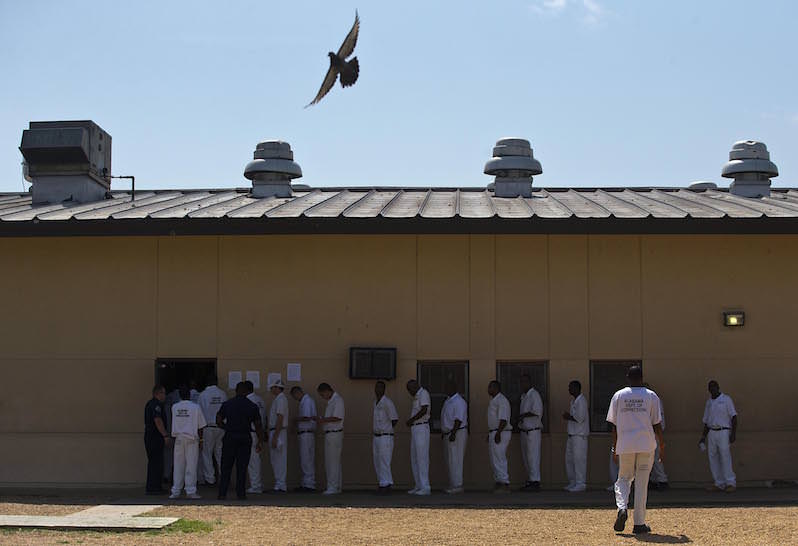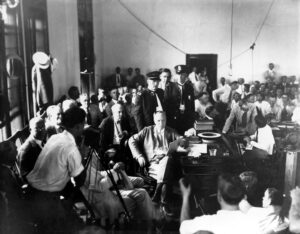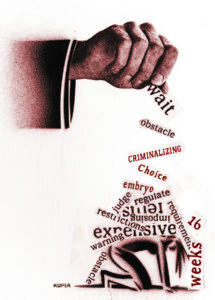Striking Prisoners Are Bending the Arc of the Moral Universe Closer to Justice
Right now, under some of the most repressive circumstances that exist in the United States, a national movement is growing for prisoners' rights. Inmates at the correctional facility in Elmore, Ala. (Brynn Anderson / AP)
Inmates at the correctional facility in Elmore, Ala. (Brynn Anderson / AP)
By Amy Goodman and Denis Moynihan
Grass-roots organizing, the hard work of building movements, can be grueling. Pay is often low or nonexistent. Success is never assured. As Martin Luther King Jr. said, “The arc of the moral universe is long, but it bends toward justice.” But it doesn’t bend itself. Right now, under some of the most repressive circumstances that exist in the United States, a national movement is growing for prisoners’ rights. The United States has less than 5 percent of the world’s population and almost 25 percent of the world’s prisoners. This movement is rippling out from a solitary-confinement cell inside the Holman Correctional Facility in rural Atmore, Alabama.
READ: Inmates Launch Series of Work Stoppages to Protest ‘Slave Labor’
“These strikes are our method for challenging mass incarceration. The prison system is a continuation of the slave system,” a man named Kinetik Justice told us on the “Democracy Now!” news hour last May. He was using a contraband cellphone from inside solitary confinement in Holman, where he was being held as punishment for his organizing. He and fellow prisoners around Alabama launched a 10-day strike on May 1, International Workers’ Day, refusing to engage in prison labor. “The reform and changes that we’ve been fighting for in Alabama, we’ve tried petitioning through the courts. We’ve tried to get in touch with our legislators. … We understood that our incarceration was pretty much about our labor and the money that was being generated through the prison system.”
Kinetik Justice co-founded the Free Alabama Movement (FAM), to organize prisoners against exploitative prison-labor programs. Despite having no access to the internet, they have a website with a downloadable book by FAM co-founder Melvin Ray that details their plight in the Alabama prison system and how they are organizing. Ray, also incarcerated, opens the book with the lines: “FREEDOM … Make no mistake about it … That’s the business of Free Alabama Movement. At some point, we (prisoners) have got to get to the point where not only have we had enough of the inhumane and unconstitutional living conditions that we are confined in, but we also have got to get to the point where we are ready, willing, and able to do something about it. This ‘something’ is a statewide shutdown on Free Labor in the form of a Non-Violent and Peaceful Protest for Civil and Human Rights.”
Their organizing continued after the May Day strike, and went national. On Sept. 9, prisoners in at least 24 states participated in a coordinated strike, marking the 45th anniversary of the 1971 prison uprising at New York state’s infamous Attica prison. Today’s striking prisoners are protesting long-term isolation, inadequate health care, overcrowding, violent attacks and slave labor.
Pastor Kenneth Glasgow of Alabama founded T.O.P.S., The Ordinary People Society, which supports prisoners and ex-convicts. An ex-prisoner himself, he told us: “Those who are incarcerated are looking at the fact that people that have paid taxes for them to be rehabilitated, for them to be educated, for them to be trained, in order to come out into society — because 98 percent of the people in prison are coming out, and in order for them to come out and be able to be productive citizens, they need to have these skills and education and all. … And yet, the taxpayers are paying anywhere from $31,000 to $80,000 per year, depending on what state you’re in, for them to get this rehabilitation and education, and they’re not getting it. What they’re getting is being used for free prison labor.”
READ: National Prison Strike Campaign Vows to End ‘American Slave System’
Last Saturday night, the Holman prisoners were joined in their strike by some unlikely allies: the prison guards themselves. Almost all the guards refused to show up for their 12-hour shift. On Sept. 1, Alabama Corrections Officer Kenneth Bettis, 44, was stabbed at Holman. He died two weeks later. Kinetic Justice spoke out on “Democracy Now!” again this week: “For weeks we’ve been communicating back and forth. This administration really has no regard for human life. And [the guards] are beginning to see that it’s not just directed at the men that are incarcerated here, that the violence that they’ve created actually spills over to the officers, as well. And a lot of them are terrified of what’s going on.”
The national scope of the prisoner strike, with actions in 40 to 50 prisons around the U.S., is truly historic, as is the solidarity demonstrated between the prisoners and the guards at Holman this week. Shut behind walls, denied access to the internet and even telephones, and prevented from easily communicating with media outlets, these prisoners are leading their own movement, with solidarity from thousands outside. “Slavery dies hard in the South,” Melvin Ray writes in his book. Through their organizing, though, these striking prisoners are bending that arc of the moral universe, ever closer to justice.
Your support matters…Independent journalism is under threat and overshadowed by heavily funded mainstream media.
You can help level the playing field. Become a member.
Your tax-deductible contribution keeps us digging beneath the headlines to give you thought-provoking, investigative reporting and analysis that unearths what's really happening- without compromise.
Give today to support our courageous, independent journalists.









You need to be a supporter to comment.
There are currently no responses to this article.
Be the first to respond.